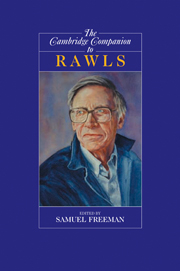Book contents
- Frontmatter
- Introduction
- 1 Rawls and Liberalism
- 2 For a Democratic Society
- 3 Rawls on Justification
- 4 Rawls on the Relationship between Liberalism and Democracy
- 5 Difference Principles
- 6 Democratic Equality
- 7 Congruence and the Good of Justice
- 8 On Rawls and Political Liberalism
- 9 Constructivism in Rawls and Kant
- 10 Public Reason
- 11 Rawls on Constitutionalism and Constitutional Law
- 12 Rawls and Utilitarianism
- 13 Rawls and Communitarianism
- 14 Rawls and Feminism
- Bibliography
- Index
6 - Democratic Equality
Rawls’s Complex Egalitarianism
Published online by Cambridge University Press: 28 May 2006
- Frontmatter
- Introduction
- 1 Rawls and Liberalism
- 2 For a Democratic Society
- 3 Rawls on Justification
- 4 Rawls on the Relationship between Liberalism and Democracy
- 5 Difference Principles
- 6 Democratic Equality
- 7 Congruence and the Good of Justice
- 8 On Rawls and Political Liberalism
- 9 Constructivism in Rawls and Kant
- 10 Public Reason
- 11 Rawls on Constitutionalism and Constitutional Law
- 12 Rawls and Utilitarianism
- 13 Rawls and Communitarianism
- 14 Rawls and Feminism
- Bibliography
- Index
Summary
THREE EGALITARIAN CHALLENGES TO DEMOCRATIC EQUALITY
Egalitarianism is not one idea but many, for there are many different kinds and degrees of equality that people can promote and still lay claim to being egalitarians. Rawls's egalitarianism is complex in what it requires, since his “democratic equality” rests on three principles of justice that interact with and limit each other. Democratic equality is also complex in its justification, since it is motivated by several distinct egalitarian ideas that must be integrated in a justifiable way. Our task in what follows is to better understand this complex egalitarian view by considering three challenges to it. First, I present a brief statement of its main ideas.
Democratic equality guarantees citizens equal basic liberties, including the worth of political liberties, through Rawls’s First Principle. His Second Principle consists of two principles that specify how the benefits of social cooperation are “open to all” and work “to everyone’s advantage.” Its guarantee of fair equality of opportunity requires that we not only judge people for jobs and offices by reference to their relevant talents and skills, but that we also establish institutional measures to correct for the ways in which class, race, and gender might interfere with the normal development of marketable talents and skills. The difference principle (DP) restricts inequalities to those that work maximally to the advantage of the worst-off groups.
- Type
- Chapter
- Information
- The Cambridge Companion to Rawls , pp. 241 - 276Publisher: Cambridge University PressPrint publication year: 2002
- 9
- Cited by



